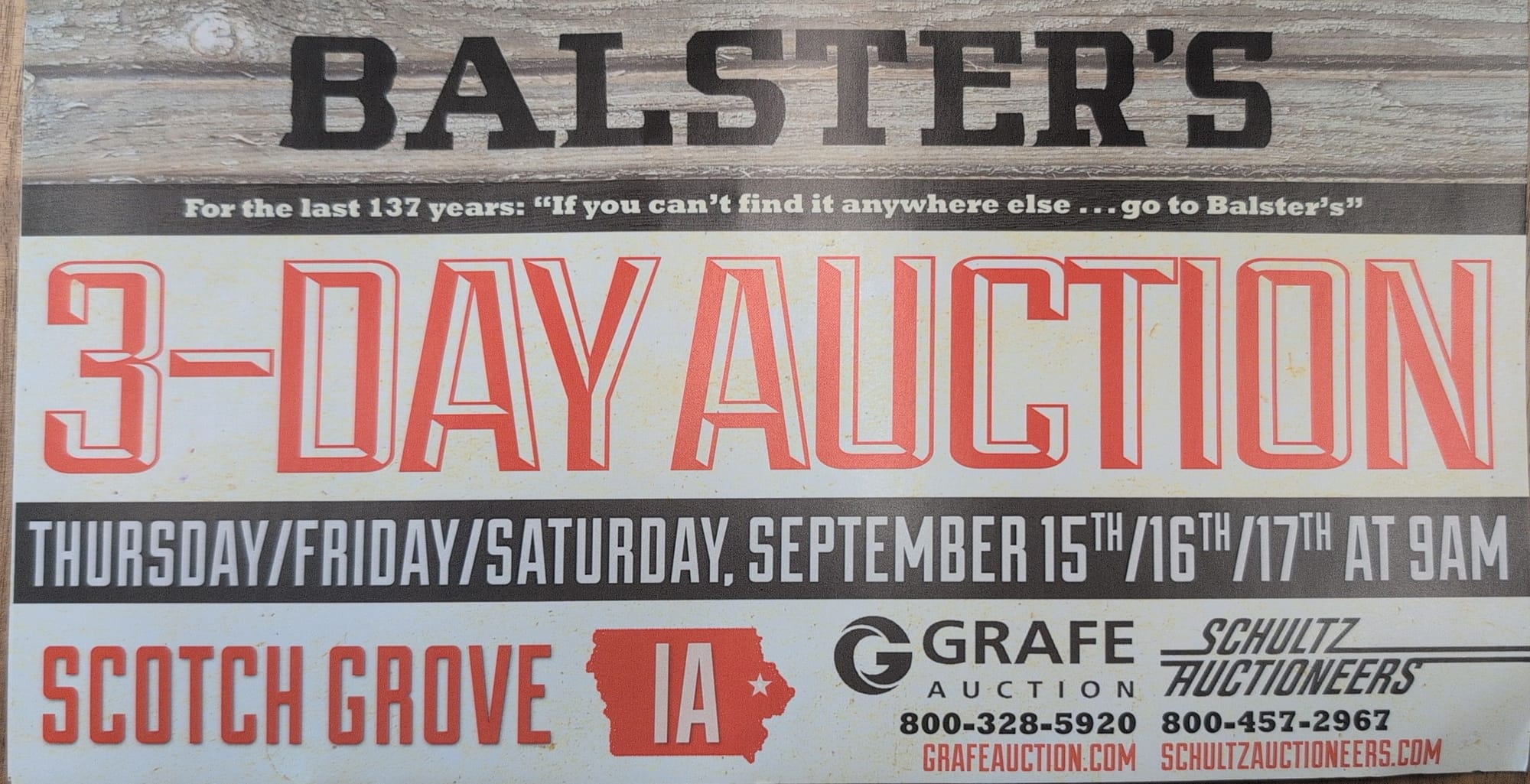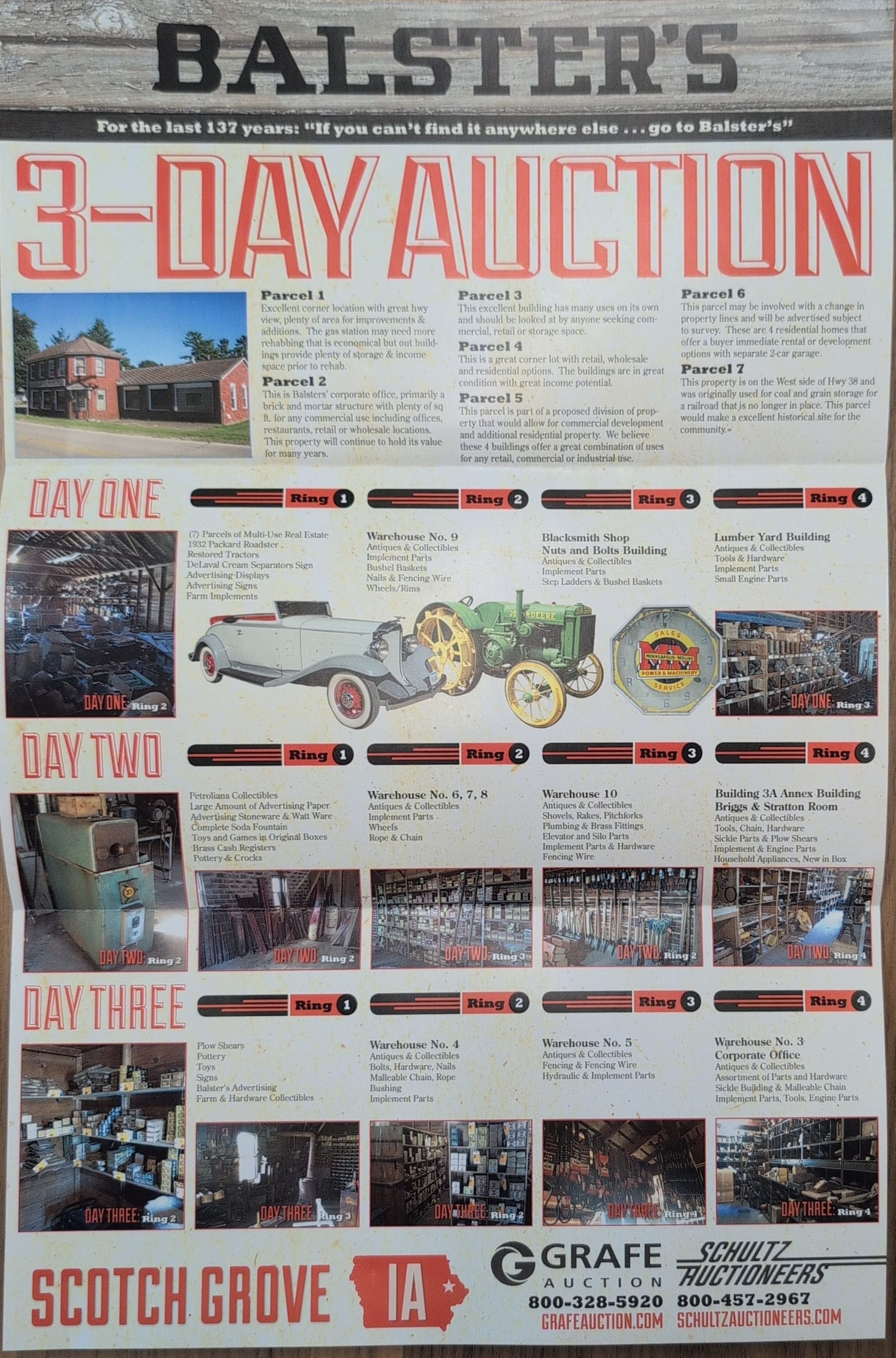From Time Capsule to Auction Block: The Historic Balster's Implement Sale

When you think of a time capsule, you might picture a small container filled with mementos for future generations. In 2011, our team at Grafe Auction had the rare opportunity to open a living time capsule-an entire town that had remained largely unchanged for over a century.[1]
A Town Built on Business
The Balster story began in 1874 when Arend Balster Sr., a German immigrant who arrived in America in 1854, established a blacksmith shop on his farm.[1] This humble beginning grew into a multi-generational business empire that would eventually encompass most of Scotch Grove. By 1912, Arend's son John opened the family's first business in town-a blacksmith and machine shop. Within a year, he expanded to include farm implements and a Ford automobile dealership.[1] Over the years, the Balsters sold everything from cars and gas to lamps and perfume, building a legendary reputation for their comprehensive inventory.
The family's business philosophy was simple: "Nothing was ever thrown away," said David Balster. "And we never liquidated anything".[1] This approach unintentionally created a museum of American commerce and agriculture, preserved for decades.
Opening a Time Capsule
When Les Balster, who had run the company since 1968, passed away in 2009 at age 89, the family made the difficult decision to close the business. "We just didn't have anybody who could do it anymore," explained David Balster.[1]
In 2011, Grafe Auction, along with Schultz Auctioneers, was tasked with handling this monumental sale. As John Schultz, vice president of operations for Schultz Auctioneers (now CMO and CTO of Grafe Auction), noted, "We've been in business as a company for 33 years and this is the first time we've ever come across a situation like this".[2] When our team and Schultz Auctioneers Landmark Realty opened the doors of 16 buildings to prepare for the sale, we found hundreds of thousands of retail, wholesale, and service items still on the shelves and floors in original packaging, like a true time capsule.[4] We organized a staff of more than 50 people to catalog the contents and promote the sale. "We had 20 semi trailers full and hadn't started with things in shelves, bins or pallets," recalled Judd Grafe.[4]

Image from the brochure for the auction.
Legacy of Rural Americana
The inventory was like nothing we had ever seen before. The auction included thousands of parts for old mowers, swathers, binders, blowers, and wagons; hundreds of mower sickles and cultivator shovels; pallets of bearings and belts; boxes of unopened spark plugs; racks of hay slings; spools of ropes; and rolls of corn planter check wire.[4] Our team found remnants of bygone eras-vintage signs from the 1920s, sickles and shovels from the 1940s and 1950s still in their original packaging, barrels full of teeth for threshing machines, and grain binder belts so old they were made of canvas. There were wood bushings, unopened oil cans for Model Ts, and sturdy, American-made bolts for farm equipment "that held America together," according to Mike Schultz.[1]
The buildings also contained BB guns and children's games from the 1940s, air raid warning sets marked 98 cents, and even a wooden stove where townsfolk once gathered to dance and stay warm on winter Saturday nights.[1] These weren't just old items-they were pristine artifacts of American rural life, commerce, and agriculture spanning more than a century.

A Historic Auction Event
The three-day auction that began on September 15, 2011, became more than just a sale-it was a cultural event that drew people from across the nation and beyond. "This was a once-in-a-lifetime auction, a fair-like event that attracted buyers who arrived by horse and buggy and corporate jets," said Judd Grafe, president of Grafe Auction Company. "We had buyers from just about every state and several foreign countries".[4]
More than 2,000 buyers were on the grounds and another 2,200 were online to bid on items sold in four rings that operated for three days.[4] The logistics were impressive, with each ring selling through hundreds of items daily. "The sale was almost like a fair, a real celebration," Grafe said. "That was the family's wish, and that's what we worked toward".[4] During the event, there was a live radio broadcast hosted by a retired 85-year-old announcer who had done a weekly remote program from Balster's many years ago, and a vendor sold malts for 9 cents.[4] "We think there were 5,000 to 6,000 people in attendance during the three days," Grafe estimated, with cars parked in fields up to six miles away.[4]
Remarkable Finds and Record Sales
The auction featured items that captivated collectors and historians alike. Some of the rarest items included the Never-Fail 5-gallon kerosene can (patented May 9, 1893 by the JH Hayes Mfg. Co. of Greenfield, Ohio) and a Martinware fuel can made in 1905 by the General Metalware Co. of Minneapolis and Portland-both with their original labels.[4] Collectors also vied for a one-gallon can of French Auto Oil, made by the Marshall Oil Company, which sold online for $1,800.[4]
Preserving a Legacy Beyond the monetary success of the auction, there was a deeper significance to the event. As Iowa preservation planner Will Page noted, "So many county historical societies have gone out of their way to bring in buildings and recreate what it was like. But this is actually an intact example of what others try to recreate".[1]
For the Balster family, the auction represented the end of an era but also provided closure. Susan Zazas expressed that she would be sad when their personal history was sold to the highest bidder. When she returned every summer, it was as if she stepped back into her childhood. "Nothing changed," she said.[1] The family's wish was for the auction to be a celebration of their legacy, and our team worked hard to honor that vision.[4]
The auction ultimately exceeded all expectations. "When we first met with the family, they had a purchase price in mind for the merchandise and the buildings. After the sale was complete and everything was tallied up, they received three times what they had expected," Judd Grafe revealed.[4]
The complex of buildings that made up almost the entire town of Scotch Grove in Jones County was bought by local residents in a huge weekend auction. Seven parcels that made up the 1.5-acre Balster's Implement & Parts Co. complex were bought "by mostly locals" with undisclosed plans for the land and buildings.[3]
A Reflection on American History
The Balster's Implement auction stands as one of the most significant events in Grafe Auction's history. It wasn't just about selling items-it was about honoring a family legacy, preserving a piece of American rural history, and connecting people with artifacts from a bygone era. Amish and Mennonite farmers from ten states were there to buy parts, tools, and equipment that may never be for sale again. Brand new parts made in the 1800s and still in their boxes were coveted by farmers who still need them and collectors who want to keep them. Parts for hay rakes, binders, cultivators, and grain cleaners were especially valuable.[4]
In many ways, this auction exemplified what makes our work at Grafe Auction so meaningful. We don't just sell items; we help transition legacies from one generation to the next, finding new homes for treasures that might otherwise be lost to time.
"I can look out this window and see all of Scotch Grove. Time stood still here," Susan Zazas reflected.[1] Through this historic auction, we were privileged to play a role in ensuring these stories and treasures would continue to be appreciated for generations to come.
Sources:
- Des Moines Register, "137-YEAR OLD FARM IMPLEMENT DISTRIBUTOR TO LIQUIDATE," Sept. 14, 2011
https://www.desmoinesregister.com/story/money/agriculture/2011/09/14/137-year-old-farm-implement-distributor-to-liquidate/20328999/ - Heather Thorstensen, "Massive auction planned for Scotch Grove, Iowa," AgriNews, September 14, 2011
https://www.agrinews-pubs.com/2011/09/14/massive-auction-planned-for-scotch-grove-iowa/ - Dave DeWitte, "Locals buy buildings and land of Balster's Implement," Sept. 19, 2011
https://www.thegazette.com/business/locals-buy-buildings-and-land-of-balsters-implement/ - "Town And Everything In It Sold At 3-Day Auction," FARM SHOW Magazine
https://www.farmshow.com/a_download_page.php?aid=MjQ5NTE=
For more information about our upcoming auctions or to learn how Grafe Auction can help with your auction needs, please contact us today.
